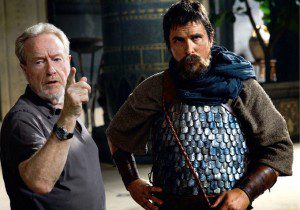 Longtime readers of this blog will know that I’m no fan of the expression “biblically accurate”. It’s not that I don’t like analyzing biblical and historical epics to see where they deviate from their source material; I do that sort of thing all the time. Rather, the problem is the way that phrase has been turned into a weapon, signifying little more than whether or not a movie has earned the approval of the person who uses that phrase.
Longtime readers of this blog will know that I’m no fan of the expression “biblically accurate”. It’s not that I don’t like analyzing biblical and historical epics to see where they deviate from their source material; I do that sort of thing all the time. Rather, the problem is the way that phrase has been turned into a weapon, signifying little more than whether or not a movie has earned the approval of the person who uses that phrase.
Just in the past year and a half, we have seen people call The Bible and its big-screen spin-off Son of God “biblically accurate” even though that miniseries was full of embellishments and got many details wrong, and we have also seen people condemn Noah for its alleged lack of accuracy even though it tackled lots of obscure biblical details that many people never think about. One film was “accurate” because it gave the audience what it wanted, and the other wasn’t because it didn’t.
So, with Ridley Scott’s Moses movie Exodus: Gods and Kings coming out just five and a half months from now, it’s time to start discussing the “accuracy” of that movie — or so one might gather from an article posted by The Hollywood Reporter the other day headlined ‘Exodus: Christian Audiences Say Their Attendance Will Depend on Adaptation’s Accuracy’. The most pertinent paragraph is this one:
According to a new American Insights survey of 1,200 respondents from Oxford-based Christian News Service, two-thirds of all adults and 74 percent of Christians are likely to see a movie related to God. However, 79 percent of those polled believe “historical and biblical accuracy is important.” In regard to Exodus, 80 percent of the Christian respondents plan to see the Scott film if it remains true to biblical accounts, compared to 29 percent if it does not.
I have no idea if this survey is legit, or if it’s one of those bogus things like the survey released by “Faith Driven Consumers” shortly before Noah came out. But it does underscore a cultural reality, which is that many Christians expect and demand “accuracy”, whatever that means, when they go to see a movie based on the Bible.
The problem is, this expectation is utterly unrealistic, and it is ill-defined.
Why do I say unrealistic? Because no movie is completely accurate. Even the Bible, in retelling some of its stories, isn’t entirely accurate in the retelling. And if you’ve seen any of Ridley Scott’s earlier epics, then you should know better than to expect any sort of “accuracy” in his films. The deeper, more important question is what sort of story he will tell, and whether it will convey something of the sense of history — and not just history for its own sake, but a sense of what that history means to us today.
And why do I say ill-defined? For the reason I gave above: because the word has little meaning now beyond a vague sense that “films I like are accurate, and films I dislike are not.” I also wonder if any of these Christians would really want to see a movie which gets into some of the really nasty stuff in the Bible — the stuff that Exodus star Christian Bale found rather “shocking” when he researched the part of Moses.
Cecil B. DeMille was blatantly inaccurate when he showed God punishing the Hebrews for their worship of the golden calf in The Ten Commandments. In the biblical version of the story, Moses tells his fellow Levites to wander through the Israelite camp, killing people at random. But in the film, God hits the camp with lightning and earthquakes, which is both more entertaining (who doesn’t love disaster-movie special effects?) and less likely to raise the sorts of moral questions that arise whenever we see people wantonly slaughtering other people in God’s name. And I’ve never heard anyone complain about the liberties DeMille took with that part of the story.
Given Scott’s own skepticism about religion, and given Scott’s own penchant for brutal violence, it would not surprise me at all if he included this episode in his own Moses movie. But would “faith-based” audiences necessarily commend him for being accurate in that way? As the saying goes, be careful what you wish for…
Incidentally, the Daily Mail published some pictures of Christian Bale and his family on Friday, and noted that Bale still seems to be wearing the “outgrown locks and ‘Moses’ beard” that he grew for Exodus. The paper asked if the film is “still shooting”, and it might very well be, given that cameras were rolling in Egypt just a couple weeks ago. But maybe Bale just likes the way his hair looks right now. Who knows.












